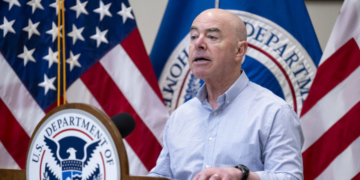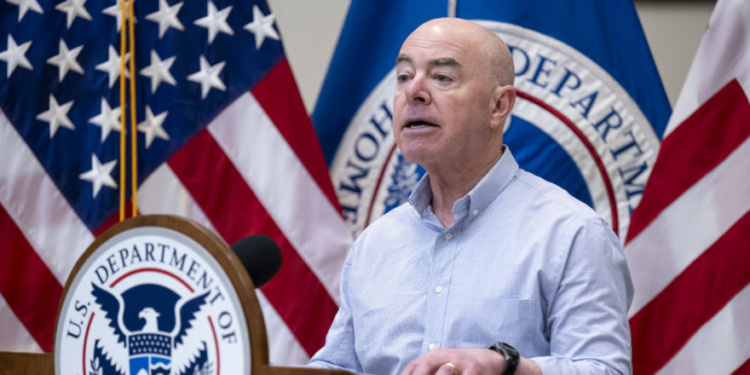The Biden-Harris administration announced it would not be extending parole for the hundreds of thousands of non-citizens enrolled in a hotly debated migrant flight program, but border hawks say the tough declaration likely won’t lead to any of them being removed from the country.
The migrants who entered the United States on two-year parole via the Cuban, Haitian, Nicaraguan and Venezuelan (CHNV) program will not see their status renewed when it ends, the Department of Homeland Security (DHS) confirmed to the Daily Caller News Foundation. In a statement, DHS warned that those who do not find other immigration arrangements or leave the country on their volition would be at risk of deportation.
“Those who do not have pending immigration benefits or who have not been granted an immigration benefit during their two-year parole period will need to depart the United States prior to the expiration of their authorized parole period or may be placed in removal proceedings after the period of parole expires,” a DHS spokesperson stated to the DCNF.
The decision — which appears to be the latest shift to the right on immigration enforcement from the administration — could put in limbo the status of the roughly 530,000 foreign nationals who entered the U.S. via the program. However, border hawks say the tough talk will not actually lead to any widespread enforcement.
“I guess they’re figuring they are going to put the onus on whoever is in [the White House] to remove the people here, and history would show that a lot of times — particularly if they’re working and they have children — they’re going to remain permanently, whether they have status or not,” said Eric Ruark, the director of research at NumbersUSA, an organization that advocates for lower levels of immigration into the U.S. “There will be an expectation that Congress will eventually amnesty them.”
“Yes, they might be ending these programs, but they’re not doing anything to remove these people from the United States,” Ruark continued.
First launched for Venezuelans in October 2022, CHNV was later expanded in January 2023 to include Cubans, Nicaraguans and Haitians. The parole program gives foreign nationals authorization into the U.S. and work permits for a two-year time period, provided they have not previously entered the country illegally and passed other vetting processes.
Over 110,000 Cubans, more than 210,000 Haitians, nearly 93,000 Nicaraguans and nearly 117,000 Venezuelans have been granted parole under the program and flown into the U.S., according to Customs and Border Protection (CBP). About 30,000 enrollees were entering the country every month.
CHNV was placed on pause in August upon the discovery of massive fraud within the program. An internal DHS audit — parts of it which were leaked to the public — discovered incredible amounts of discrepancies among applicants, such as 100,948 CHNV forms being completed by just 3,218 sponsors, 24 of the 1,000 most used Social Security numbers by sponsors belonging to a deceased person and an IP address located in Tijuana, Mexico, being used more than 1,300 times, among other red flags.
Despite the severe level of fraud uncovered, DHS resumed CNHV in August, just a few weeks after confirming it was placed on hold.
“I was not surprised by the amount of fraud,” Ruark said. “I do think that had a lot to do with why they ended the program because they don’t want it to be continued when you have a new administration coming in who can show how much fraud and abuse there was in the system.”
“Or if you have more congressional oversight looking into these programs, they could say ‘well we ended these programs’ and so you don’t have to have all that public scrutiny or exposure,” Ruark went on.
Other critics of the parole program, such as House Homeland Security Chairman Mark Green, say it has simply served as a means to allow otherwise-inadmissible aliens into the country en masse. The Republican congressman was also skeptical that the end of their CHNV parole would mean they’d be leaving the U.S.
“This move is yet another optics-driven smokescreen from the Biden-Harris administration,” Green stated. “There are numerous other ways these inadmissible aliens could be — and likely will be — allowed to stay, including through applying for asylum or Temporary Protected Status.”
“Even if they don’t, however, given [Immigration and Customs Enforcement’s] low enforcement rates under this administration, most simply will not be priorities for removal,” he continued.
In their statement confirming CHNV parole would not be renewed, DHS did suggest those enrolled in the program could “seek humanitarian relief or other immigration benefits for which they may be eligible.” Additionally, the latest ICE data shows enforcement actions by the agency have dropped considerably since the beginning of the Biden-Harris administration, drawing to question whether a Harris administration would crack down on former CHNV parolees remaining in the U.S. unlawfully.
There were a total of 273,708 deportations of illegal migrants during the first three fiscal years of the Biden-Harris administration, which includes removals from ICE officers and other federal immigration agents, according to data compiled by the National Immigration Center for Enforcement (NICE). This number marks a considerable drop from the 749,462 deportations that took place during the first three fiscal years under the Trump administration.
“Overall, convicted criminal alien removals have decreased by 74%, completely undercutting the assertion by Kamala Harris that ICE has merely increased its focus on criminal aliens,” NICE’s report stated. “In fact, her policies have ensured that most illegal aliens can remain in the country indefinitely — even those who have committed a crime.”
After presiding over an historic level of illegal immigration into the country, the Biden-Harris administration has appeared to moderate its agenda on border enforcement in the run-up to the presidential elections.
President Joe Biden in June announced an executive order that essentially shut down the U.S.-Mexico border until the number of daily illegal encounters falls below a certain threshold. He doubled down on this policy in September by extending the timeline it would take for the order to be deactivated, essentially ensuring it would remain in place throughout the remaining days of the presidential election.
The administration’s decision to not renew parole for CHNV enrollees appeared to be the latest act of an immigration crackdown. Ruark, however, said the move is meaningless without deportations taking place.
“If they wanted to do a dog and pony show to demonstrate that they are tough, they would make a big deal about removing violent criminal aliens, but they aren’t even doing that,” Ruark said.
Featured Image: Official DHS image/Tia Dufour
All content created by the Daily Caller News Foundation, an independent and nonpartisan newswire service, is available without charge to any legitimate news publisher that can provide a large audience. All republished articles must include our logo, our reporter’s byline and their DCNF affiliation. For any questions about our guidelines or partnering with us, please contact [email protected].



























 Continue with Google
Continue with Google